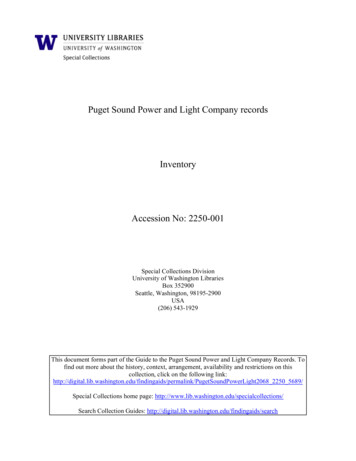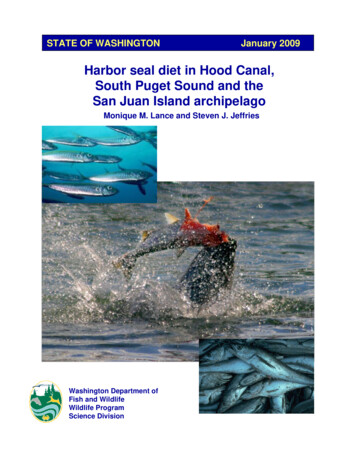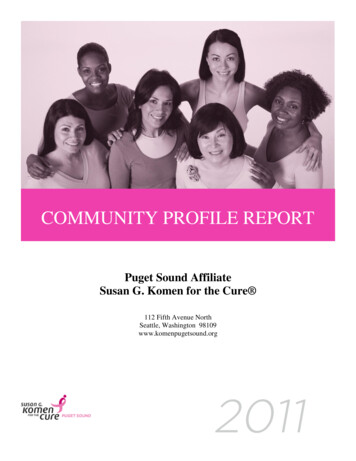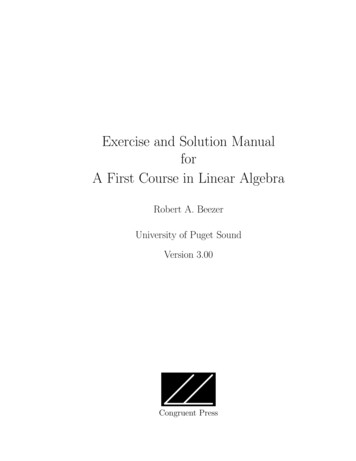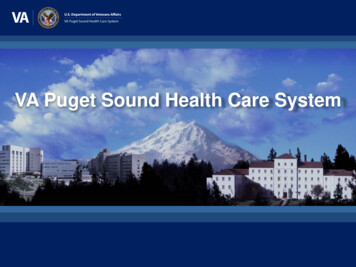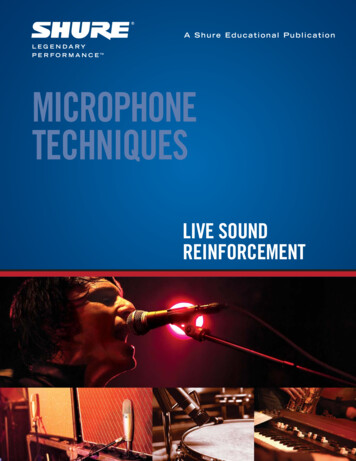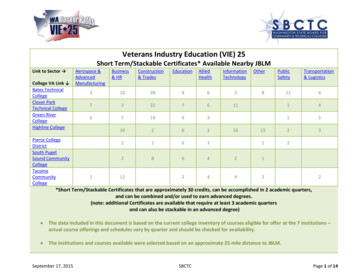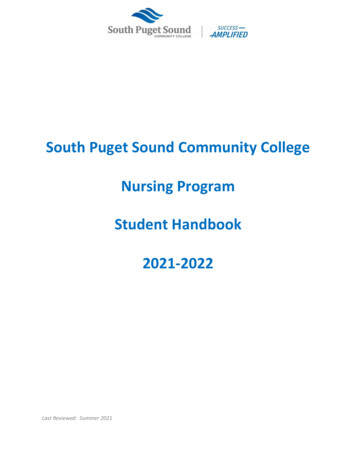
Transcription
South Puget Sound Community CollegeNursing ProgramStudent Handbook2021-2022Last Reviewed: Summer 2021
WELCOMEWe, the staff and faculty of South Puget Sound Community College, are so thrilled for you tobe here while you pursue the wonderful profession of nursing. You have worked hard to get tothis important step in your education and we look forward to working with you and supportingyour journey into Registered Nursing.We believe that you chose South Puget Sound Community College not only because of yourinterest in nursing, but also because you feel that this program would best fit your needs. Beassured that we will work in partnership with you to facilitate your success.This information will supplement the college catalog and SPSCC general studenthandbooks, which includes the Nursing Program's mission, vision, values, learningoutcomes, and conceptual framework and contains specific policies, procedures andguidelines impacting nursing students.We hope this handbook will answer many of your questions and will be a reference for youthroughout your time in the program. It is essential that you familiarize yourself with thesepolicies, procedures and guidelines. The content may not be announced verbally, therefore,it is advised that you keep this handbook available for reference until you graduate from theNursing Program. If you have any questions after reading this handbook, please ask a facultymember for clarification.You have chosen the nursing profession because of your interest in nursing and your desire tohelp others. The faculty and staff are eager to facilitate your personal and academic growth.After completing this program you will have developed skills that you will use for the rest ofyour life. We wish you the best as a practicing RN because your future in the nursingprofession reflects upon South Puget Sound Community College.Have a fantastic 2 years!! You can do this! We believe in you!SPSCC Nursing TeamSouth Puget Sound Community College NursingInformation: https://spscc.edu/healthcare/nursing2011 Mottman Rd SWOlympia, WA 98512Allied Health OfficeBuilding 34,218P) 360.596.5285F) 360.596.57172
Student HandbookWELCOME . 2INTRODUCTION . 6ACCREDITATION . 6SPSCC STUDENT RIGHTS AND RESPONSIBILITIES. 6NURSING PROGRAM MISSION, VISION & VALUES . 8NURSING PROGRAM CONCEPTUAL FRAMEWORK . 9NURSING PROGRAM STUDENT LEARNING OUTCOMES (PSLO) . 10NURSING CURRICULUM AT SPSCC . 10Associate Nursing DTA/MRP Degree . 10Completing the Nursing Degree. 10Program Curriculum . 11Class Schedule . 12Initial Licensure Outside of Washington State. 12ACADEMIC . 13Guidelines for Admission and Retention in the Nursing Program . 13Orientation . 13Change of Data. 13Multiculturalism, Diversity and Inclusion . 14Grades and Grading Scale . 14Retention Requirements . 15Progression Requirements . 15Graduation Requirements . 16Pinning Requirements . 16Withdrawal and/or Dropping Nursing Courses . 17Readmission of Nursing Students . 17Academic Integrity . 18Plagiarism . 19Examinations . 19NCLEX Success . 20Testing Accommodations. 20Tutoring . 21Exam Taking Tips . 21Standardized Testing. 23Dosage Calculation Exams . 25Student Success Plans . 25Student Health . 27Attendance. 27Professional Appearance Regulations . 29Inclement Weather . 30Library . 31Computer Lab. 313
SKILLS LAB . 32Skills Training Resources . 32Lab Guidelines . 32Guidelines . 32Open Lab Guidelines . 33Dress Code . 33Technology . 33Supplies/Equipment. 33Incident Injury . 35Standard Precautions: Exposure to Bodily Fluids . 35Invasive Procedures . 35Your Rights and Responsibilities . 36Finger-sticks . 36Injections . 36Venipunctures . 37Latex Warning . 37Usage and Re-Usage . 37Sharps and Biohazards in Skill Lab . 37Skills Demonstrations. 38CLINICAL . 39Immunizations . 39Agency Requirements . 39Nursing Clinical Assignments . 42Ethical and Legal Responsibilities of Students . 42Confidentiality . 43Social and Electronic Media . 44Just Culture . 45Incident Reporting and Tracking . 46Clinical Accidents and Errors . 47Student Accidents . 47Automated Drug Distribution Devices (ADDD) . 48Safe Medication Administration by Nursing Students . 48Preceptorship . 49Suspected Substance Abuse in the Student Nurse . 49Procedure: . 50CLINICAL SIMULATION . 51STUDENT . 52Nursing Program Communication . 52Netiquette . 52Nursing Activities . 52Class Representatives . 53Cohort Meeting with the Dean . 53Guiding Principles for Student Conduct . 53Professional Failure . 54Student Grievance Process . 554
Course and Curriculum Evaluations . 56Professional Advancement . 56SUMMARY . 60REFERENCES . 61APPENDICES . 62Appendix A . 63Appendix B . 64Appendix C . 66Appendix D . 68Appendix E . 69Appendix F . 70Appendix G . 71Appendix H . 73Appendix I . 74Appendix J . 75Appendix K . 77Appendix L. 81Appendix M . 82Appendix N. 84Appendix O. 85Appendix P . 88Appendix R . 89Appendix Q. 90Verification Statement Form . 925
INTRODUCTIONWelcome to the South Puget Sound Community College (SPSCC) Nursing Program! The NursingProgram is located on the Mottman campus with clinical experiences provided in a variety ofhealthcare settings in the surrounding locations. Students completing graduation requirementsfor the Associate in Nursing Direct Transfer Agreement/Major Related Program (DTA/MRP) areeligible to apply for licensure as registered nurses (RN). We actively encourage all graduates toprogress to a Bachelor of Science in Nursing (BSN) degree after completion of their nursingprogram at SPSCC.SPSCC’s Nursing Program has been created to meet the health care needs in the local regionand communities that you serve. This will be accomplished through a dynamic, creative, andinformed concept-based program grounded in excellence and evidence-based nursing practice.Dedicated individuals interested in becoming a Registered Nurse are prepared in our two-yearprogram to provide safe & effective individualized care, facilitate compassion & comfort,innovate practice standards, advocate for updated care delivery models, and to be an activeprofessional leader.ACCREDITATIONSouth Puget Sound Community College is accredited by the Northwest Commission on Collegesand Universities (NWCCU).The Nursing Program is approved by the Washington State Nursing Care Quality AssuranceCommission (NCQAC).The South Puget Sound Community College Associate Degree in Nursing program is accreditedby the National League for Nursing Commission for Nursing Education Accreditation (NLNCNEA) located at 2600 Virginia Avenue, NW, Washington, DC 20032, 202-909-2526.SPSCC STUDENT RIGHTS AND RESPONSIBILITIESThe materials in the Nursing Handbook for the student of the Associate in Nursing DTA/MRPhas been prepared to enhance the understanding of the principles and guidelines of the degreeand program. These materials link both faculty and student rights and responsibilities thatpromote educational growth and development for successful course completion. (See CohortCanvas Shell or the SPSCC website for SPSCC Code of Students Rights & Responsibilities.SPSCC Faculty shall: Provide a high-quality nursing education program that promotes an education thatallows for individual differences and needs within the limitation of the program. Promote a learning environment that links theory and practice concurrently as much aspossible, therefore strengthening the education process. Provide a curriculum that allows students to progressively build knowledge on previousconcepts, while also linking concepts together to provide holistic client care. Provide feedback and guidance throughout the program as a faculty mentor and inclass/clinical evaluations, student success forms, and professional guidelines whichempowers student to become competent practitioners who are ethically and legallyqualified to obtain and maintain a license to practice.6
SPSCC Student shall: Assume responsibility for self-direction and motivation that is necessary for successfulcourse completion. Achieve outcomes, as outlined in the course syllabi, through successful didacticexamination as well as lab and clinical practice. Progress in the predetermined/defined sequence of learning with the assistance of afaculty member. Demonstrate commitment and engagement to the learning process. Set aside differences, appreciating varying perspectives, and work together with peers,faculty, and healthcare members, for the mutual goal of client safety. Adhere to all guidelines and processes outlined in the program orientation and thisstudent handbook.7
NURSING PROGRAM MISSION, VISION & VALUESMissionThe Nursing Program at South Puget Sound Community College prepares students to engagewithin the nursing profession, to thrive in the work force, and to further advance theirprofessional knowledge and practice. This is achieved through an emphasis on lifelong learning,integration of technology, and information derived from evidence-based practice. Our studentswill be supported to be successful within the nursing program at SPSCC and providedopportunities for a seamless transition to their BSN and beyond.VisionSouth Puget Sound Community College’s Nursing Program is recognized as a leader in the SouthSound region. Partnership with local stakeholders, innovative curricular design, and inclusion ofa diverse student population prepare graduates to address diverse local and global communityhealth and wellness needs. Graduates will be prepared to pursue further education and tobecome nurse leaders, innovators, and creative community partners in the continually evolvingnursing profession.ValuesThe values of the nursing program at South Puget Sound Community College reflect nursing andnursing t RespectEffective CommunicationExcellence with IntegrityHumor and Laughter8
NURSING PROGRAM CONCEPTUAL FRAMEWORKThe SPSCC Nursing Program prepares you to take on the nursing arena through an integratednursing curriculum that spans across the lifespan. This preparation builds upon foundationalconcepts and exemplars that advance from simple actions and client management to morecomplex care scenarios, actions and client management. This structured conceptual approachto curriculum design was specifically crafted to encourage depth of knowledge and studentsuccess. The SPSCC Nursing Program takes a fresh approach to preparing you to be a RN bypresenting content in a fashion that enhances your obtainment of the knowledge, skills, andabilities requisite to be a safe, ethical, and effective care provider.“Nurses provide integrated care in a variety of environmental settings to promote, maintain,and restore health in effort to support quality of life and loss/transition into death forindividuals, families, groups, communities, and beyond.” (Re-Design Nursing Faculty, 2013).Wellness (promotion) (maintenance) (restoration) IllnessComplexSimple9
NURSING PROGRAM STUDENT LEARNING OUTCOMES (PSLO)Graduates of SPSCC’s Nursing Program are prepared to use their skills in critical thinking anddata analysis as well as their understanding of relationships and responsibilities to: Demonstrate the ability to assess, diagnose, plan, safely implement, and evaluatenursing plans of care which address the holistic needs of diverse individuals, families,groups, and communities.Acquire & implement new scientific knowledge & use technology to enhance nursingpractice.Communicate effectively in full partnership to facilitate delivery of care.Participate ethically and professionally in local and global communities as an entrylevel nurse.See the table in appendix A for more detailed information about these outcomes. Furthermore,these program student learning outcomes interlink with professional standards in nursing thatare referred to throughout the nursing curriculum. See appendix B for a cross reference ofprogram student learning outcomes and professional standards.NURSING CURRICULUM AT SPSCCAssociate Nursing DTA/MRP DegreeSPSCC Nursing Program degree plan meets the requirements for Washington’s Direct TransferAgreement. The Nursing DTA/MRP Pathway Map can be found in appendix C. Also see CollegeCatalog for Program Description of all Prerequisite general education and nursing courses.Completing the Nursing DegreeTo graduate from the nursing program at South Puget Sound Community College withan Associate in Nursing DTA/MRP degree, the student must complete the following:1. Prerequisites: ENGL& 101 – English Composition (B or better) MATH& 146 – Intro to Stats (B or better) PSYC& 200 – Lifespan Psychology (B or better) BIOL& 241 – Anatomy & Physiology I (B or better) within seven years of admission BIOL& 242 – Anatomy & Physiology II (B or better) within seven years of admission BIOL& 260 – Microbiology (B or better) within seven years of admission CHEM& 121- Intro to Chemistry (B or better)2. General education requirements: BIOL& 160 – General Biology w/ Lab OR BIOL& 211 – Majors Cellular Communications, 5 credits from DTA list Humanities, 10 credits from DTA list PSYC& 100 – General Psychology NUTR& 101 - Nutrition10
3. Nursing programmatic courses with a final grade of C (77.00%) or better.4. It is the student's responsibility to be sure that all courses required for theircertificate/degree are satisfactorily completed. Education planner and faculty mentorsare available if there are questions about the student’s status in the program.5. Each student is required to submit a ‘Petition for Graduation’ to the enrollment office upto two quarters before and no later than one year after the final class (this is completedduring your Transition to Practice course, 6th quarter of the program).6. The college has one graduation ceremony at the end of the spring quarter. All studentsare encouraged to participate in the ceremony.7. A nurse pinning ceremony may be held at the completion of the sixth quarter.Attendance is not mandatory but all graduates are strongly encouraged to attend. **Seepinning requirements for more details.Program CurriculumCurriculum content is organized by concept. You will learn nursing-related concepts in eachcourse and then progressively build knowledge on previous concepts, as well as learning to linkconcepts together to provide holistic client care. The following concepts are included in thecurriculum listed by quarter of introduction. Each quarter will build on the subsequent quarter,in complexity, in alignment with our conceptual framework. This list shows when the conceptis introduced only, multiple times throughout the program, these concepts will be discussedagain with different exemplars. The course syllabi provide a complete list of the concepts andexemplars to be covered in each course.Quarter 1Quarter 2Quarter 3Quarter 4Quarter 5Quarter 6ComfortCellularRegulationAddictionAcid Base BalanceCultural HumilityCognitionHealthcare Policy& ProcedureLeadership galitiesFluids ure &DiversityEliminationEthicsGrief & LossHealth Promotion& ProfessionalFoundationsPerioperative/Postoperative rySafetyTissue IntegrityMobilityMood & AffectStress & CopingTraumaSexuality11QualityImprovement
Class ScheduleThe quarterly class schedule for the nursing program, specific to lab and clinical courses, areposted in the Cohort Canvas shell. The schedule posted will give you your specific section ID tobe enrolled in, therefore, please do not register for your nursing courses prior to the schedulebeing posted in the shell. The posted schedule is final with no changes. Faculty try their best toget the schedule out as early as possible because we do understand the need to plan forchildcare, work, etc., but we cannot accommodate student’s special requests.If you must register for courses before the schedule is available due to financial requirements,register for the appropriate courses and when the schedule is finalized, you may need to switchto a different section ID. In that case, you would drop/add courses so that you are enrolled intothe section assigned to you by the nursing program.The quarterly schedule provided by the nursing program will reflect accurate dates, rooms, andtimes.Initial Licensure Outside of Washington StateThere are some students who plan on moving outside the state of Washing
The South Puget Sound Community College Associate Degree in Nursing program is accredited by the National League for Nursing Commission for Nursing Education Accreditation (NLN CNEA) located at 2600 Virginia Avenue, NW, Washington, DC 20032, 202-909-2526.
